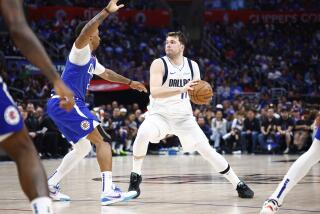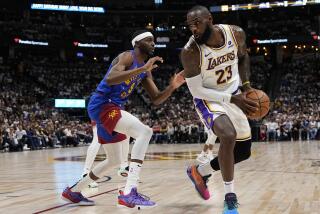Stern Wants Labor Gains
- Share via
DENVER — Cognizant that the NHL season has fallen through the ice, NBA Commissioner David Stern and NBA Players’ Assn. executive director Billy Hunter put on a happy face Saturday and proclaimed their desire to hammer out a new collective-bargaining agreement by the end of the season.
Meeting with the media a day before the league’s annual All-Star game, Stern and Hunter showed none of the public acrimony displayed between NHL owners and players, and they referred to the lost hockey season on more than one occasion while discussing their own possible predicament as the July 1 expiration of the NBA’s collective-bargaining agreement approaches.
For now, it was smiles all around -- Stern even referred to it as a “collective-bargaining bouillabaisse” -- amid hopes the NBA would not come close to the NHL’s cancellation of a season.
“It’s the opening prayer at each of our meetings,” said Stern, who substituted optimism for sarcasm when talking of a possible agreement by season’s end. “It may be combining sort of reality with hope, but I think there will be a deal by the end of the season.”
Neither Stern nor Hunter would comment on specific issues, but the three main topics being discussed behind locked doors involve contract lengths for players, the possible installation of an age limit for players entering the NBA draft and the possibility of giving Stern more disciplinary power.
Owners are believed to be pushing for four-year maximums on all player contracts, while the union is fighting for six-year contracts. The current contract maximum is seven years -- six years with either a player or team option for the seventh year.
There currently is not an age requirement for players who wish to enter the NBA draft, but the league is leaning toward installing an age minimum of 20 for potential draftees.
Finally, the league is hoping to increase Stern’s disciplinary power, an issue that moved to the forefront after the brawl between Indiana Pacer players and Detroit fans last November. Stern’s disciplinary action was undercut by a federal-court decision that shortened the penalty he imposed on Pacer forward Jermaine O’Neal, from 25 games to 15.
“There’s a wide array of subjects that we’ve started to go over, have been over, moved around a bit, and you know, it’s going to be a long list of things,” Stern said. “That’s why we’re getting back to New York [this week]; we’re going to spend three days a week, it looks like, until we either can’t stand each other or we can make a deal. Or maybe we will stand each other and we still won’t make a deal. But one way or the other, we’re going to exhaust ourselves.”
Both sides hope to avoid a lockout such as the one that shortened the 1998-99 season to 50 games. Players lost about $600 million in salary and owners each lost 32 games’ worth of revenue until a six-year collective bargaining agreement was signed. That agreement set caps on individual salaries, among other precedents.
“We think there’s a possible window of opportunity for which we can generate a lot of goodwill if we can come to a meeting of the minds and we think that we’ll then project the NBA in a very positive position, particularly in view of what’s happening in ice hockey,” Hunter said. “We went down that road seven years ago. We are trying to avoid it.”
Players, for their part, are generally optimistic of a palatable outcome for both sides. Of course, hockey gets mentioned in most lockout analyses, even those from 350-pound centers.
“What we don’t need is a lockout and possibility of the cancellation of a season like hockey,” Shaquille O’Neal said. “Right now, everything is going perfect. We’ve got media here, the kids are loving it, jersey sales are good. If it’s not broke, you shouldn’t fix it.”
Other players mindful that the NBA became the first major professional league to set a maximum salary with the 1998-99 agreement, hoped the union wouldn’t bow to owners.
“I’m more worried about a bad deal than a lockout because I don’t think the NBA wants to go into a lockout after seeing what happened to hockey,” Boston Celtic swingman Paul Pierce said. “It might mean we take another bad deal, but I don’t know.”
Perhaps the only thing Stern and Hunter disagreed about publicly Saturday was the expansion of the NBA’s six-team development league, known as the “D” league.
Stern said the league was looking to add four teams in Southwestern cities, with the hopes of creating a minor league system akin to that of baseball.
Hunter, however, said he struggled with such a forecast, setting the tone for the union’s non-insistence of an age minimum for the NBA.
“I guess in view of [Friday] night where you watch the rookie-sophomore game and you see the talent, obviously there are 24 players that were reflected there,” Hunter said. “I guess it would be difficult for me to envision some of those guys playing in the ‘D’ league. But it’s just something we have to address as we go.”
And if all the addressing doesn’t lead to an agreement?
“I can see you [media] folks just having a field day with us,” Hunter said. “And I don’t want to go through that.”
More to Read
Go beyond the scoreboard
Get the latest on L.A.'s teams in the daily Sports Report newsletter.
You may occasionally receive promotional content from the Los Angeles Times.







